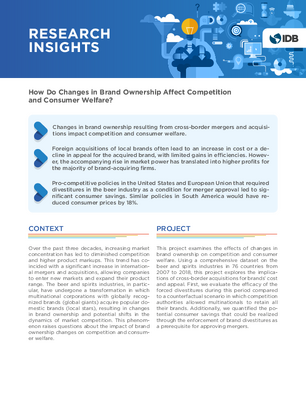Research Insights: How Do Changes in Brand Ownership Affect Competition and Consumer Welfare?
Date
Aug 2023
Changes in brand ownership resulting from cross-border mergers and acquisitions impact competition and consumer welfare. Foreign acquisitions of local brands often lead to an increase in cost or a decline in appeal for the acquired brand, with limited gains in efficiencies. However, the accompanying rise in market power has translated into higher profits for the majority of brand-acquiring firms. Pro-competitive policies in the United States and European Union that required divestitures in the beer industry as a condition for merger approval led to significant consumer savings. Similar policies in South America would have reduced consumer prices by 18%.




